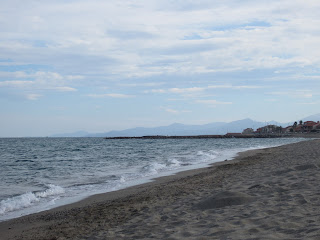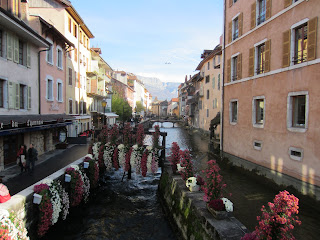A general thing I feel that I have learned in the first five weeks: we, as a human-collective, know very little about language acquisition. There is a smaller-than-normal-hand-handful of theories and that's basically it. How exciting; SLA is a completely open research field. Why can't we get all that far in such an open space? Theories even give us hints regarding in which direction we should run. The problem is (in the words of an unfit five-week-old-student) the black box that every theory contains; our brain. We can assess, to a certain extent, input and output, that which goes into the brain and that which comes out. What happens in the middle is, theory.
Here is a peek into the program. The Associative-Cognitive Creed/Frequency Input model roughly paints our brain as a statistician. The brain tallies every single occurrence of certain sound patterns from small to large, vowels to full sentences. For every count, it also associates and tallies a particular meaning. For native English brains, the sound "left" has been registered thousands and thousands of times. Each tally also has a related meaning. When the brain perceives the word in a new incident, it accesses it's statistical database and weighs the probabilities of the different experienced meanings. It compares this information with the current context and makes the most probable association ready for our understanding. One implication of this theory is that native-like fluency is more idiomatic than it is creative. This speaks to the tremendous speed of native language; it is much easier and quicker for our brain to recall archived sets than to assemble things anew.
I am enjoying my studies. I feel like I should be working harder, but this feeling is comforted by the knowledge that I will have more to do than I find pleasant when I begin to write papers. For now I am enjoying a joyous balance between the different aspects of my life. After my exchange year in 09/10 I had a conversation with a German doctorate student and teaching assistant at the UW-Madison. I told her that I struggled with the German education system, or better put, with the German student life. I come from studying at UW-Madison, USA, where being a bachelor student means, or at least meant for me and for many others, being part of a wonderful, all-encompassing life bubble. Studies are at the university, work is at the university, housing, food, friends, sport, health; everything is at the university. The university is your Big Brother. It's very nice!
'At a German university,' there are classes. The German university is an academic institute, a very good one. It is however not a life bubble. Work, sport, health, housing, food, and friends are not neatly and tightly packed into one system like they are in Madison. They are indeed to be found at the university, but are not as outlined and accessible as in Madison. I struggled to find all these life pieces and fit them together; I was used to just having them all, readily available, at the university.
The German doctorate student and TA was in fact a fan of the US system. She wished that Germany had the same support-network for its students as the Madison system did. (Yet I can't remember if we talked about financial systems and supports. Studying in Germany is free. Studying in the US teaches students about debt.) She did have her criticisms as well. She asked me if I didn't feel like someone was holding my hand the entire time when I was at Madison. There's a good point to this. In Madison I was, to a certain degree, given a life-package. Here I have to amass and maintain my own. That's difficult, and sometimes depressing when coming from the Madison-bubble. But now I've done that and things feel stable. In Madison I had one great provider in university, but leaving that world meant dropping much of my life-package. Now I have many different buttresses coming from various directions, and I built and chose most of them. My life feels strong for that.
Freiburg is also a bubble, a green one. I am reminded of this when I travel elsewhere. There are more incentives to ride bikes or public transportation or take your feet in Freiburg than I see in other places. Most public trash bins here have three compartments for proper sorting, and most people use them. Solar panels and wind turbines are easy to spot from anywhere in the city. There is even a neighborhood (Vauban, my exchange-year home) that collects more energy (solar) than it uses. That's a green bubble. From a particular perspective atop Rosskopf, Freiburg's backyard mountain, the bubble looks like this:
View from the Schlossberg beer garden, just for a pretty impression of Freiburg :).
Change of pace: here are recounts of last month's adventures.
Shortly after taking the language entrance exam I scurried down to Perpignan- a small city in southern France where Marina is studying for a year- for a long week. The 500 mile trip towards the equator brought summer weather. We spent every other day on the beach.
Where coastline meets mountain: the French-Spanish border.
There is a splendid bus network in Perpignan for which one pays one euro and gets a ride for upwards of an hour in any direction. This is the view from such a bus taking us to...
such a beach.
Views from the same bus, leaving Banyuls-sur-Mer, a town just a couple miles north of Spain, about 30 miles south of Perpignan.
This beach was reached by means of bike. 10 Kilometers and a bike path, for the most part. The first time we rode to the shore we left at shortly after 5pm and arrived at shortly after 6. We rode back in the dark. The second time we rode to the shore, it was dark before we even got to the beach. That's the glory of it! One is so close to the water, it's worth it just for a late night bike ride and stroll! And dip, if one pleases.
Jumping ahead: A couple weeks later Marina's family had a hiking reunion in Münstertal, a village south of Freiburg in the Black Forest. I happily joined for the weekend and got to hike Belchen, one of the largest peaks in the Black Forest. I've been there a couple times now and do believe it is my favorite. To me it feels like an eternally large forest always filled with light fog and mystery. I do confess, many forests feel like this to me. After all, I did grow up with Narnia and Lord of the Rings.
Here are a couple pictures.
Beginning to ascend the Belchen.
The snow covered mountain in the distance is where we're headed.
Lunch break in a little hut along the way.
The weather turned as we neared the top. It stayed relatively harmless and made for a fun stormy scramble :). For someone into the fantastic and German romanticism, this photo is not very far from Casper David Friedrich's Wanderer über dem Nebelmeer.
A couple weeks later, my friend Tobi and I went for a morning hike on Knybsfelsen. This is the view from the southern tip of Freiburg, looking out towards Switzerland.
Shortly thereafter, a new roommate of mine, Antonio, and myself went for a short weekend-getaway to Annecy, France. I'd been there twice before, but had only visited the beach, or at least that's all I remember. This time we had a chance to get to know the city a bit as well.
Notice the mountain that looms over the city from yonder.
The lake is actually directly next to the city (app. 200,000 residents), though it looks like it's secluded. The water is strikingly clear; it flows down from the surrounding mountains and goes through countless natural filtration processes before collecting.
We began hiking up that looming mountain and got as far as this cliff. Unfortunately I don't have a broad shot; the cliff took over the entire mountain. We are perhaps 1/3 the way up and that is as far as one can get. Unless one has rope.
Little travel buddy came with me!
1818, Wanderer über dem Nebelmeer, Casper David Friedrich.
That'll do it for this post. In a few hours I'm off to Lyon for a long weekend. woohoo!
Many cheers and smiles.
Love,
Ben. :)

























